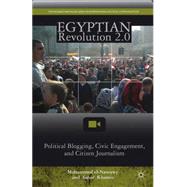Egyptian Revolution 2.0 Political Blogging, Civic Engagement, and Citizen Journalism
, by el-Nawawy, Mohammed; Khamis, Sahar- ISBN: 9781137020918 | 1137020911
- Cover: Hardcover
- Copyright: 5/22/2013
The Egyptian revolution that took place on January 25th, 2011 and lasted for 18 days, leading to the ousting of Egyptian President Hosni Mubarak, has been inspired and instigated in part by social media, such as Facebook, Twitter and blogs. In this context, a senior advisor to U.S. Secretary of State Hillary Clinton, said: 'Social media didn't cause the revolution but it had three big impacts: it accelerated movement making, made weak ties between people stronger and distributed leadership through networks' (Matthews, 2011). Blogging is the umbrella that entails all other forms of social media, such as Facebook and Twitter, since political bloggers oftentimes include links to these other types of social media in their postings and make constant references to them in their blogs. These new media forms exemplify the concept of citizen journalism that had an impact on Egyptian civil society before, during and after the recent Egyptian revolution. This book will shed light on the growing phenomenon of cyberactivism in the Arab world, with a special focus on the Egyptian political blogosphere and its role in paving the way to democratization and socio-political change in Egypt, which culminated in Egypt's historical popular revolution. In doing so, it examines the relevance and applicability of the concepts of citizen journalism and civic engagement to the discourses and deliberations in five of the most popular political blogs in Egypt, through exploring the potential connection between virtual activism, as represented in the postings on these blogs, and real activism in Egyptian political life, as represented in the calls for social, economic and political reform on the streets.






